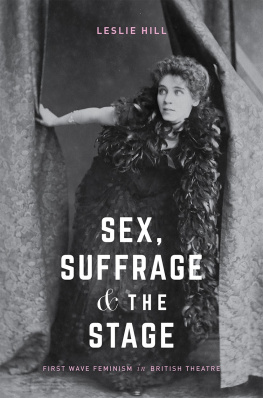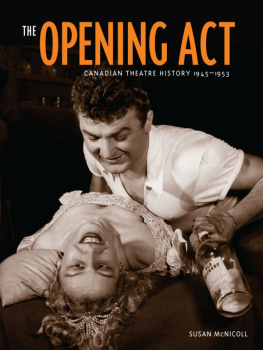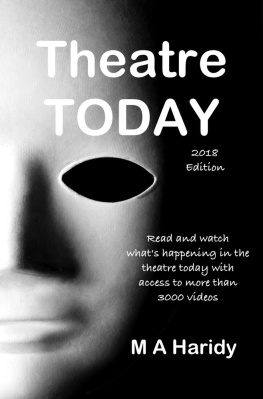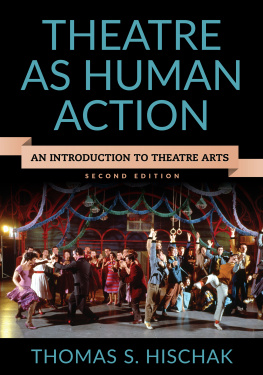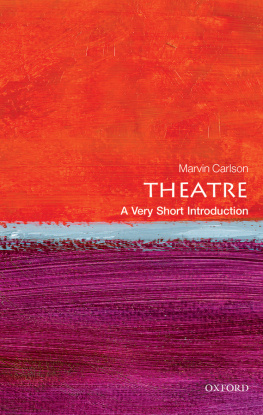LUDICS IN SURREALIST THEATRE AND BEYOND
Taking as its point of departure the complex question about whether Surrealist theatre exists, this book re-examines the much misunderstood artistic medium of theatre within Surrealism, especially when compared to poetry and painting. This study reconsiders Surrealist theatre specifically from the perspective of ludicsa poetics of play and gamesan ideal approach to the Surrealists, whose games blur the boundaries between the playful and the serious.
Vassiliki Raptis aims are threefold: first, to demystify Andr Bretons controversial attitude toward theatre; second, to do justice to Surrealist theatre, by highlighting the unique character that derives from its inherent element of play; and finally, to trace the impact of Surrealist theatre in areas far beyond its generally acknowledged influence on the Theatre of the Absurdan impact being felt even on the contemporary world stage. Beginning with the Surrealists one-into-another game and its illustration of Bretons ludic dramatic theory, Rapti then examines the traces of this kind of game in the works of a wide variety of Surrealist and Post-Surrealist playwrights and stage directors, from several different countries, and from the 1920s to the present: Roger Vitrac, Antonin Artaud, Gnter Berghaus, Nanos Valaoritis, Robert Wilson, and Megan Terry.
Vassiliki Rapti is Preceptor in Modern Greek in the Department of
The Classics at Harvard University, USA, where she is also serving
as Research Fellow in Greek Literature and Language Pedagogy at
the Harvard Center for Hellenic Studies (Washington, D.C.).
ASHGATE STUDIES IN SURREALISM
Series Editor:
Gavin Parkinson, The Courtauld Institute of Art,
University of London, UK
With scholarly interest in Surrealism greater than ever, the Ashgate Studies in Surrealism series serves as a forum for key areas of Surrealist inquiry today. This series extends the ongoing academic and popular interest in Surrealism, evident in recent studies that have rethought established areas of Surrealist activity and engagement, including those of politics, the object, photography, crime, and modern physics. Expanding and adding various lines of inquiry, books in the series examine Surrealisms intersections with philosophical, social, artistic, and literary themes. Potential subjects to be examined in the context of Surrealism include but are not limited to: nature; queer studies; humor and play; science; theory in the 1950s and 1960s; the New Novel; Surrealist activities beyond Paris.
Proposals are welcomed for both monographs and essay collections dealing with the above subjects or with discussions of Surrealism in other aspects and genres. Monographic writings on artists and writers who have been generally overlooked by English-language scholarship (for instance, Victor Brauner, Toyen, Jorge Camacho) would also fall within the scope of this series.
LUDICS IN SURREALIST THEATRE AND BEYOND
Vassiliki Rapti
ASHGATE
Vassiliki Rapti 2013
All rights reserved. No part of this publication may be reproduced, stored in a retrieval system or transmitted in any form or by any means, electronic, mechanical, photocopying, recording or otherwise without the prior permission of the publisher.
Vassiliki Rapti name has asserted her right under the Copyright, Designs and Patents Act, 1988, to be identified as the author of this work.
Published by
Ashgate Publishing Limited
Wey Court East
Union Road
Farnham
Surrey, GU9 7PT
England
Ashgate Publishing Company
110 Cherry Street
Suite 31
Burlington, VT 05401-3818
USA
http://www.ashgate.com
British Library Cataloguing in Publication Data
Rapti, Vassiliki.
Ludics in Surrealist theatre and beyond.(Ashgate studies in surrealism)
1. Surrealist games. 2. Experimental theater. 3. Surrealism (Literature) 4. Comic, The.
I. Title II. Series
792022dc23
The Library of Congress has cataloged the printed edition as follows:
Rapti, Vassiliki.
Ludics in surrealist theatre and beyond / by Vassiliki Rapti.
p. cm.(Ashgate studies in surrealism)
Includes index.
ISBN 978-1-4094-2906-7 (hardcover : alk. paper) 1. TheaterHistory20th century. 2. Experimental theater. 3. Surrealism (Literature) 4. Breton, Andr, 18961966Influence. I. Title.
PN2189.R37 2013
809.291163dc23
2012034194
ISBN 9781409429067 (hbk)
ISBN 9781472412263 (ebk-PDF)
ISBN 9781472412270 (ebk-ePUB)
To Andreas.
CONTENTS
LIST OF ILLUSTRATIONS
So I am inclined to distinguish between the essence and the inessential in a game too. The game, one would like to say, has not only rules but also a point.
Ludwig Wittgenstein
ACKNOWLEDGMENTS
This book is the final product of my long commitment to surrealist theatre. My interest in the subject began in 2000, and evolved considerably from those beginnings, in particular thanks to the apprenticeship I served under the author Nanos Valaoritis. The last Greek Surrealist has helped me tremendously by so generously entrusting to me all his unpublished archives and kindly permitting me to work on them and publish them in part. Moreover, during our endless telephone discussions for more than a decade now, he has enlightened me on various issues that I would otherwise not have noticed. For all this and more, I am profoundly grateful to him.
I would also like to express my gratitude to my mentor Stamos Metzidakis and my colleagues Stratos Constantinidis and Olga Taxidou for their stimulating intellectual exchange throughout the book project.
I am also grateful to my colleagues at Harvard University, especially Kathy Coleman, Ivy Livingston, John Duffy, Michael Herzfeld, Rha Karabelas-Lesage, Greg Nagy, Panagiotis Roilos and Mark Schiefsky, who along with the staff of the Department of the Classics, Teresa Wu and Alyson Lynch, secured me an inspirational research environment.
Special thanks are also due to all those affiliated with several public and private foundations that supported this project over the years, especially the Greek State Scholarship Foundation, the Alexander S. Onassis Public Benefit Foundation and Washington University in St. Louis.
I am also grateful to many of my friends who supported me over the years in many ways, in particular, to John Anton, Diane Miles-Touliatos, Jane Loe, Jerry McAdams, Vinia Tsopelas, Julia Dubnoff, Anna Stavrakopoulou, and Eva Prionas, for their constant care, and the late Venetia Gavrielatou for being an inexhaustible source of wisdom and encouragement.
My thanks also are extended to Amy Debrecht, Nicole Miller, and Susan Kapit-Husserl for their comments on stylistic matters at various stages of preparation of my manuscript. My warmest thanks also go to Katalin Mitchell for granting me permission to search the Robert Wilson Archives at the American Repertory Theater and to use the pictures from the production of Robert Wilsons Alcestis that have been included in , one of which appears on the cover of this book. Megan Terrys generosity extended to the invaluable comments she provided on the way she approaches games; I found all her commentary truly enlightening. I would like to thank Tonda Marton for putting me in touch with Megan Terry. I would like to express my gratitude to Pella Publishing Co., and McFarland & Company, Inc. for granting me permission to include here parts of my articles on ludics, first published in their journals Charioteer and Text & Presentation, respectively. Special thanks are also due to all those affiliated with several public and private foundations that supported this project over the years, especially the Greek State Scholarship Foundation and the Alexander S. Onassis Public Benefit Foundation. I am also grateful to many of my friends who supported me over the years in many ways, in particular, to John Anton, Diane Touliatos, Jane Loe, Vinia Tsopelas, and Eva Prionas, for their constant care, and the late Venetia Gavrielatou for being an inexhaustible source of wisdom and encouragement. I am deeply grateful to Melanie Stowell for her diligent treatment of my manuscript. Without her excellent and conscientious work, this book could not have been completed. I wish to thank Ashgate Publishing, especially Meredith Norwich, Margaret Michniewicz, Beatrice Beaup, Emily Ruskell and Jonathan Hoare, for all their help, as well as the Studies in Surrealism series editor Gavin Parkinson of the Courtauld Institute of Art. Last but not least, I am grateful to my family, particularly to my mother and parents-in-law, my sisters and my husband Andreas, for their patience, support and love, and to our daughter, Katerina Maria, who in her own way helped facilitate the completion of this project.
Next page

